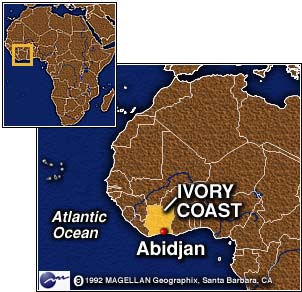France urged its citizens in war-torn Ivory Coast’s main city to come to the embassy or a hotel for their safety, as a battle for Abidjan loomed.
 France urged its citizens in war-torn Ivory Coast's main city to come to the embassy or a hotel for their safety, as a battle for Abidjan loomed.
France urged its citizens in war-torn Ivory Coast's main city to come to the embassy or a hotel for their safety, as a battle for Abidjan loomed."Our ambassador in Abidjan issued a message to the French community informing them of this decision and giving them instructions to follow," Foreign Ministry spokesman Bernard Valero said Monday.
The relocation of Abidjan's 12,000 French nationals is voluntary, he said.
The move comes as fighters backing internationally recognized President Alassane Ouattara battled forces loyal to Laurent Gbagbo, who refuses to leave office.
France sent an additional 350 peacekeepers to the country over the weekend and took control of the airport in Abidjan, the French Ministry of Defense said Sunday.
The new French troops joined the existing United Nations peacekeeping mission of about 7,500 troops already in the country.
United Nations helicopters and French forces patrolled the skies over the city as a tense calm reigned Sunday, a local resident said.
The resident, whose name will not be named to protect his safety, said he had been to church as usual, where another parishioner said he had seen dead bodies by the road on his way to the congregation.
 Foreign journalists reported being targeted and scrutinized. A group of journalists from the French TV channel France 2 were fired on by Gbagbo's forces when they tried to leave the Novotel hotel in Abidjan, according to the channel and two journalists who did not want their names used to protect their security.
Foreign journalists reported being targeted and scrutinized. A group of journalists from the French TV channel France 2 were fired on by Gbagbo's forces when they tried to leave the Novotel hotel in Abidjan, according to the channel and two journalists who did not want their names used to protect their security.Since then, Gbagbo forces have been patrolling the hotel premises, preventing foreign journalists staying there from leaving, the sources said.
A journalist in the city said many people were afraid to leave their homes, but were being forced to venture out to get water.
Seyi Rhodes, who is staying at a hotel in Abidjan, said people were risking being shot in order to get to a water pump near the hotel. He saw French journalists come under fire as they drove through the city, he said.
Much of the city has no electricity, he added, calling it "a really crude tactic to get people out on the streets."
The United Nations moved about 200 personnel within the country for their own safety as the situation got worse, spokesman Nick Birnback said Sunday.
"Peacekeepers and staff have been attacked over the last few days, we've taken some casualties, and we are doing everything we can do to guarantee security as best as possible. The situation is deteriorating and is getting worse," he said.
U.S. Secretary of State Hillary Clinton demanded Sunday that Gbagbo step aside immediately.
"Gbagbo is pushing Cote d'Ivoire into lawlessness," she said, using the French name for the country. "He must leave now so the conflict may end."
 She also called "on the forces of President Ouattara to respect the rules of war and stop attacks on civilians."
She also called "on the forces of President Ouattara to respect the rules of war and stop attacks on civilians."A French plane evacuated about 170 foreigners from Abidjan to Dakar, Senegal, according to Col. Thierry Burkhard of the French Ministry of Defense.
The International Crisis Group called for an immediate cease-fire on both sides and more international intervention, calling the situation in Ivory Coast as "urgent as any facing the international community right now. The unthinkable is unfolding before our eyes."
The International Committee of the Red Cross said Friday that 800 people had been shot to death in the western cocoa-producing town of Duekoue. A United Nations official put the death toll so far at 330 on Friday.
The massacre occurred last week between Monday and Wednesday as Ouattara's Republican Forces led an offensive through the country to Abidjan, said Guillaume Ngefa, the deputy human rights director at the U.N. mission in Ivory Coast.
He blamed 220 deaths on forces loyal to Ouattara. Ngefa said pro-Gbagbo forces killed 100 people.
The Ouattara camp said it "firmly rejects such accusations and denies any involvement by the Republican Forces of Cote d'Ivoire in possible abuses."
Ouattara denied to U.N. secretary-general that his forces were responsible, but said he had launched an investigation and that he would welcome an international inquiry, according to the world body.
Ngefa said so far, 320 bodies have been identified and the actual number could be much higher. He said the dead included civilians as well as mercenaries.
 Before the Duekoue killings, human rights monitors documented 462 deaths in the Ivory Coast conflict, which would make the Duekoue massacre the single bloodiest incident yet.
Before the Duekoue killings, human rights monitors documented 462 deaths in the Ivory Coast conflict, which would make the Duekoue massacre the single bloodiest incident yet.The massacre illustrated the bloody nature of Ivory Coast's conflict, now in its fifth month. The violence erupted after a disputed November election led both Gbagbo and Ouattara to claim the presidency.
The international community recognized Ouattara as the legitimate winner but Gbagbo refused to cede power and violence engulfed the nation, escalating this week with a major offensive launched by Ouattara's forces.
Gbagbo's whereabouts were unknown. He has not recently appeared in public and the French ambassador said his residence was empty.
The violence has also displaced 1 million of Abidjan's 4 million people.
